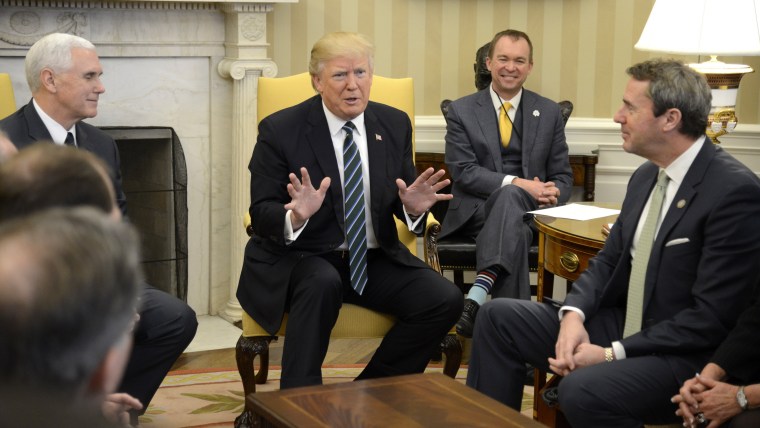The GOP health care bill received a major boost Friday as critical Republicans who had been opposed pledged to support it after being offered changes to the legislation. The movement has given House Republican leadership a shot of confidence, scheduling a vote on the American Health Care Act before the full House next Thursday.
At a meeting between President Donald Trump and some skeptical members of the House, Trump offered concessions to help bring the members on board to support the bill that would repeal and replace the Affordable Care Act, also known as Obamacare.
“The president asked us specifically if we would support him on the American health care act … and we went forward with a yes,” said Rep. Mark Walker, head of the Republican Study Committee.
Getting the support of that group of GOP House members better solidifies support for the bill at a moment when its passage appeared in peril. The development gave House Speaker Paul Ryan the chance to move forward in scheduling next week's vote — on a day which is also the seventh anniversary of the Affordable Care Act was signed into law.
This is one of many meetings Trump has hosted with Republicans on health care, but after promising to negotiate and failing to fully endorse the Republican measure, this meeting included the most tangible negotiations to date to help appease concerned Republicans and was his most vocal endorsement.
"I want to let the world know, I'm 100 percent in favor," Trump said before the meeting. "These folks -- and they are tough and they love their constituents and their county -- these folks were nos, mostly nos, yesterday and now every single one is a yes."
Walker brought nine members who were also opposed to the bill with him to the White House Friday morning and afterwards said all of them are now on board, including Rep. Gary Palmer of Alabama, who voted against the bill Thursday in the House Budget Committee.
The promised changes to the bill focus mostly around Medicaid and provides states the option to block grant the health care program for the low income, giving a specific sum of federal money to states to implement their own program. The bill currently would implement a structure that caps Medicaid funding based on population. Conservatives say this change gives states more flexibility. Opponents say it will severely limit the number of people who will have access to Medicaid because once the money runs out, it’s out.
The other change imposes optional work requirements for Medicaid recipients. While the program is optional it provides incentives for states to implement them.
A third change is the assurance that tax credits for people who purchase insurance in the independent market won’t be used for abortion.
Rep. Andy Barr of Kentucky is also now on board after the changes promised at the White House meeting.
“This solidifies my support,” Barr said.
But the momentum doesn’t yet ensure the measure’s passage.
The conservative Freedom Caucus, which consists of about 40 House members, is still not on board, per a tweet Friday.
And moderate Republicans, who were concerned about too drastic of a roll back of Medicaid, won’t be sold by the changes that further exacerbate a reduced Medicaid program that the poorest citizens rely upon.
To accommodate moderates, a change in the tax credits is possible, especially one that better helps seniors.
"I felt the tax credits in the current version of the bill are not sufficient to help a lot of lower and moderately income working Americans and particularly those between the ages of 50 and 64," said Rep. Charlie Dent, R-Penn.
The Congressional Budget Office report on the AHCA said that older Americans’ cost of health insurance would dramatically rise - by as much as 700 percent - under the Republican plan.

